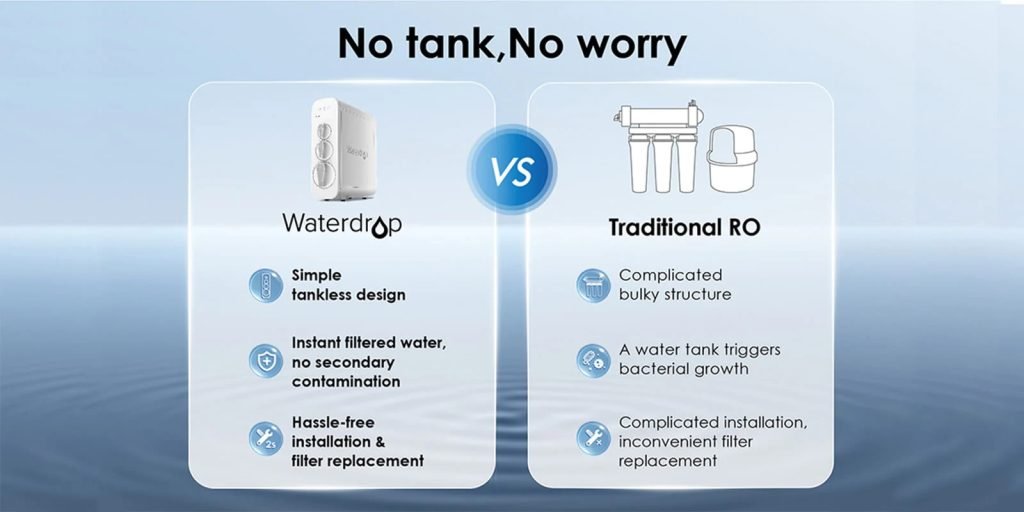Last Updated on January 11, 2026 by Rida Gul
With improved living standards, people are becoming more focused on living healthy lives. Therefore, people naturally value water because it is the most indispensable part of life. Therefore, many people choose bottled water to access safe and healthy water. But is bottled water really a good choice? Kindly read on to find out.
Table of Contents
Why Should You Stop Drinking Bottled Water?
Environmental pollution
Disposable plastic bottles are made from refined plastic from petroleum. And most bottled water is packaged in these bottles. Unfortunately, plastic bottle production consumes energy, creating an enormous carbon footprint.
Another problem is recycling disposable plastic bottles. In the U.S., over 29 billion water bottles are sold in a year. And for every six bottles sold, only one is recycled. The non-recycled bottles then end up in landfills and the ocean.
In nature, one non-recycled plastic bottle requires at least 1,000 years to decompose. And scientific studies show that toxins leach into the environment during the plastic decomposition process. These toxins lead to significant health problems, including cancer and reproductive issues.
Health risks
PFAS, which is short for Per- and polyfluorinated substances, is a problem widespread in bottled water. PFAS is a group of man-made chemicals resistant to water, heat, and oil. Over time, this chemical leaches into the water in the bottle.
PFAS is also known as the forever chemical because of its persistence and accumulation in the environment. Long-term exposure to PFAS compounds increases cholesterol risk and leads to diseases like thyroid hormone disruption and cancer. The chemical buildup also affects the immune system and impacts infant birth weights.

What Are The Best Alternatives To Bottled Water?
Tap water
Tap water is an excellent alternative to bottled water because it is readily available and does not harm the environment. And because of its low cost, tap water is fairly cheaper and safer than bottled water.
But, tap water is not entirely safe. The water contains chlorine residue, heavy metals, and impurities from aging piping systems. Therefore, learning how to treat tap water before you drink it directly from the faucet is essential.
Filtered water
Ultrafiltration
The Ultrafiltration membrane is microporous with a pore size ranging between 0.001 and 0.02 microns. However, water molecules, trace elements, and minerals with smaller pore sizes can pass through the ultrafiltration membrane under certain pressure. But, the membrane filters out macromolecular particles like rust, bacteria, and colloids. Thus these impurities stay on one side of the membrane and are eventually discharged, purifying the water.

The Waterdrop Ultrafiltration Under Sink Water Filter System[D1] is ideal for home water filtration. The Waterdrop ultrafiltration filter system uses a finer UF membrane of 0.01-micron pore size compared to other ultrafiltration systems on the market. Consequently, the system removes chlorine and adsorbs lead, fluorine, chloramine, heavy metals, and VOCs. Furthermore, the Waterdrop system has no water line connections and zero wastewater.

Reverse Osmosis
The reverse osmosis membrane is similar to the ultrafiltration membrane. However, this membrane is semi-permeable and has a pore size of 0.0001 microns. Consequently, it offers the finest filtration accuracy.
Even at high pressures, only water molecules and ionic mineral elements pass through the RO membrane. Therefore, impurities dissolved in the water, including inorganic salts, heavy metals, bacteria, organic matter, and viruses, cannot pass through the RO membrane. Consequently, the membrane separates the permeated pure water and impermeable wastewater.
The Waterdrop filter’s no-tank design is an ideal alternative to bulky tanks and unsightly filters cluttering your under-sink area. The system is minimal, with a height below 18 inches and a width below 6 inches. Furthermore, the brand is famous for its advanced tankless reverse osmosis systems[D2], and there are several options you can choose from to suit your home needs.

Conclusion
Every citizen on earth needs to be involved in protecting the environment. You can opt for filtered water for your safety and the environment’s safety. Drinking filtered water also reduces plastic waste generation and disposal.
Apart from that, if you are interested to know about Bottled Water Versus Tap Water then visit our Lifestyle category.























